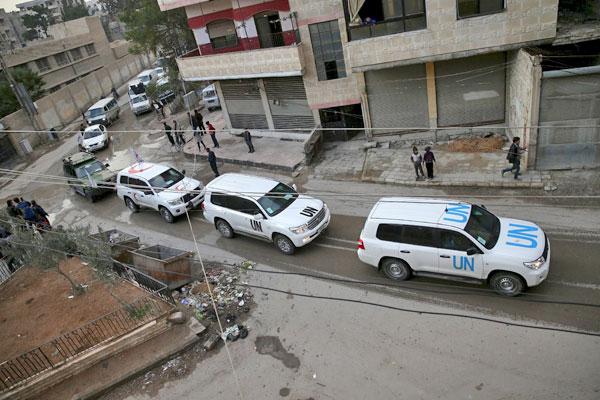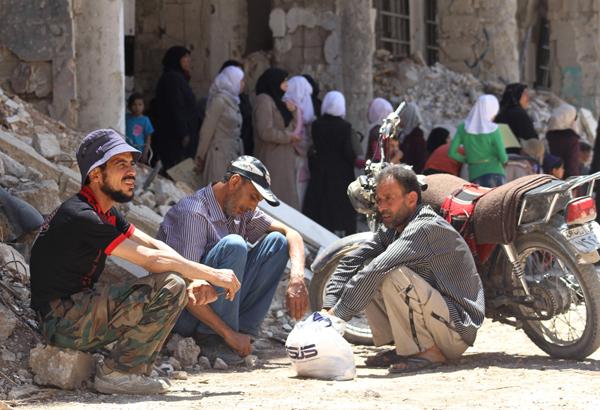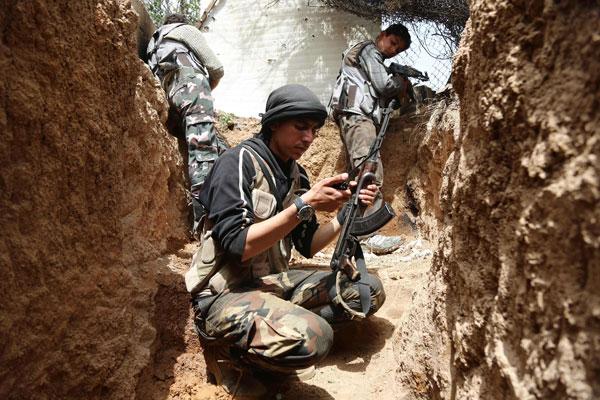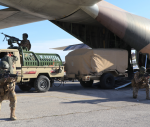You are here
Russia, Syrian army pound rebels ahead of fighting halt
By Reuters - Feb 25,2016 - Last updated at Feb 25,2016

Syrian Arab Red Crescent and UN vehicles drive through the rebel-held besieged city of Douma towards the besieged town of Kafr Batna to deliver aid, on the outskirts of Damascus, Syria, on Tuesday (Reuters photo)
BEIRUT — Russian warplanes bombed Syrian rebel-held areas in northwestern Syria and government forces pounded a suburb of the capital on Thursday, ahead of a planned halt to fighting which rebels predicted Damascus and Moscow would ignore.
The "cessation of hostilities" agreed by the United States and Russia is due to take hold on Saturday morning from midnight. But opponents of President Bashar Assad say they expect the government to press on with its advance, by branding opposition fighters Al Qaeda militants unprotected by the truce.
Damascus has agreed to the deal, as has the main opposition alliance, though it is only ready to commit for two weeks given its deep reservations. But the government and its allies will be permitted to forge on with strikes against militants of Daesh and an Al Qaeda-linked group, Al Nusra Front.
The government also says the agreement could fail if foreign states supply rebels with weapons or insurgents use the truce to rearm.
Fighting in the final days before the truce has focussed on Daraya, a besieged suburb of the capital held by fighters the government describes as Al Nusra militants but rebels say are from other groups, and on the northwest near the Turkish frontier.
Four months of Russian air strikes turned momentum Assad's way in a five-year-old war that has killed more than 250,000 people, created the world's worst refugee crisis and seen Daesh militants declare a "caliphate" in Syria and Iraq.
The multi-sided civil war has drawn in most regional and global powers, with Western countries, Arab states and Turkey forming a coalition against Daesh while also backing rebels fighting to overthrow Assad. Russia and Iran support him.
Barrel bombs
The Syrian Observatory for Human Rights, a British-based group that monitors the conflict, said army helicopters dropped at least 30 "barrel bombs" on Daraya on Thursday. Assad's opponents say the army drops oil drums filled with explosives and shrapnel to cause indiscriminate harm in rebel areas.
The government blamed groups linked to Al Nusra for firing mortars into residential areas of Damascus, killing at least one person.
A spokesman for rebels in southern Syria predicted Daraya would be the first place where the truce would collapse.
“They want to exploit the ceasefire and focus their fire on Daraya to take it. This will be the first breach. We won’t accept it,” said Abu Ghiath Al Shami, spokesman for the Alwiyat Seif Al Sham group, part of a rebel alliance in the south.
A Syrian military source also signalled that Damascus would not cease fighting in Daraya.
“There is evidence that the ones there are Nusra Front. They found documents, books, flags that point to Al Nusra Front being in Daraya,” the military source said. “In any place where there is Al Nusra Front, we will continue operations.”
Fighting has also escalated in the last two days in the northwestern province of Latakia, where Free Syrian Army groups backed by Assad’s foreign enemies operate close to Al Nusra fighters and other militants.
“The regime wants to try to retake all of northern Latakia before February 26,” said Fadi Ahmad, spokesman for the First Coastal Division rebel group, speaking to Reuters from the area.
“The battles are very fierce. Yesterday, there were heavy battles in the part of rural Latakia that is still with us,” he said, adding he did not expect the government or its Russian allies to abide by the truce: “Three minutes ago I saw a Russian plane in the sky hitting us here in rural Latakia.”
The Syrian military source also said operations were taking place in the northern Latakia area.
Recapturing areas of Latakia province at the Turkish border has been a top priority for Damascus and its allies since Russia began its strikes. It is one of several areas where the government has made major gains this year.
Rami Abdulrahman, director of the observatory, confirmed heavy air strikes in northern Latakia on Wednesday and Thursday. He predicted the presence of Al Nusra Front and like-minded groups would give the government grounds to press on with fighting there under the agreement.
One of the main purposes of the cessation of hostilities is to allow aid to reach civilians, especially in besieged areas cut off from supplies.
A UN air-drop of food to 200,000 people in the besieged city of Deir Ezzor failed on Wednesday, with all 21 palettes dropped by parachute either damaged, landing in no-man’s land or unaccounted for, a UN World Food Programme spokeswoman said.
UN adviser Jan Egeland nevertheless said the cessation of hostilities could rescue the civilian population from “the abyss” and end the “black chapter” of sieges.
Assad told Russian President Vladimir Putin on Wednesday his government was ready to help implement the halt to fighting. The two leaders nevertheless stressed the importance of an “uncompromising” fight against Daesh, Al Nusra Front and other extremists not party to the truce.
US President Barack Obama on Wednesday said he was cautious about raising expectations, but if some progress were made that would lead to a political process to end the war.
Russian officials have seized on comments by Secretary of State John Kerry that Washington would consider a “Plan B” if the ceasefire failed. Russia’s RIA news agency quoted Foreign Minister Sergei Lavrov saying there was no such “Plan B”.
Foreign Ministry spokeswoman Maria Zakharova accused “some US officials” of trying to “sabotage” the ceasefire plan.
United Nations Syria envoy Staffan de Mistura said he would announce on Friday a date for a new round of talks between Syria’s warring parties.
Related Articles
BEIRUT — Washington and Moscow scrambled to salvage Syria’s shaky ceasefire on Tuesday as the country reeled from jihadist bombings that kil
BEIRUT —The Syrian opposition cast doubt on Wednesday on whether UN-backed peace talks would go ahead on March 9 as planned, as rebels said
BEIRUT/MOSCOW — The Russian air force and Syrian military are preparing a joint operation to take Aleppo from rebels, the Syrian prime minis


















